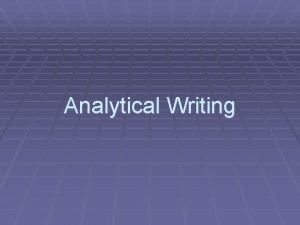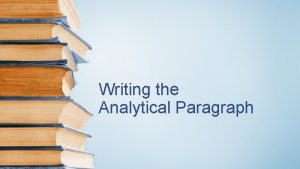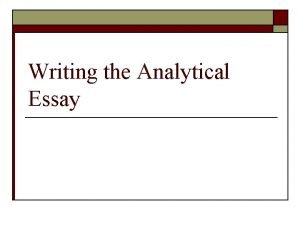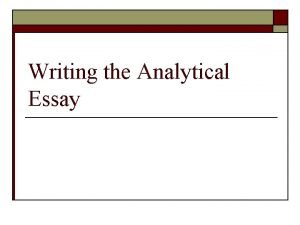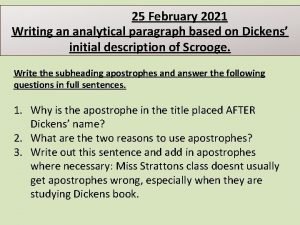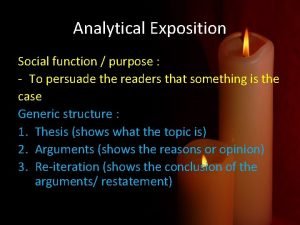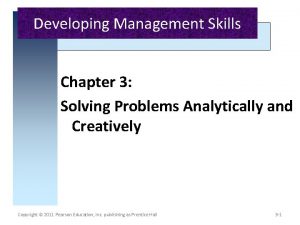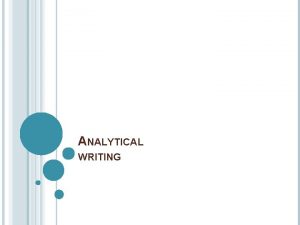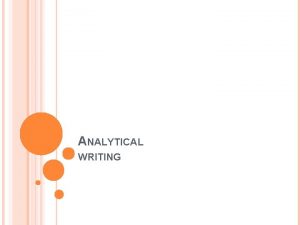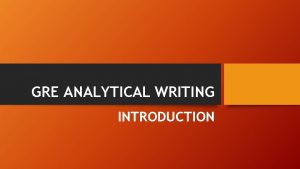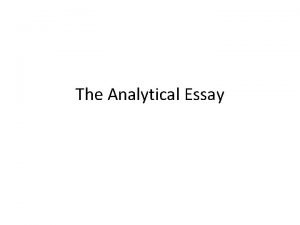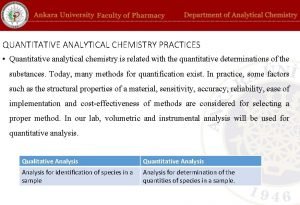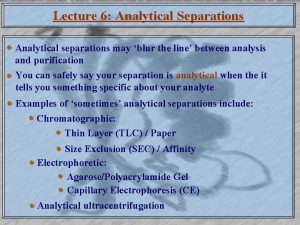Analytical Writing What is Analytical Writing Analytical writing











- Slides: 11

Analytical Writing

What is Analytical Writing? § Analytical writing: § Evaluates data § Distinguishes the important from the less important § Relates one idea and its details to another

An Analytical Writer Should… § Organize material in a proper manner § Reveal that organization in the document § Help the reader recognize the logical development of the writing and see how the bits and pieces fit together

Types of Analyses in Analytical Writing § Rhetorical analysis § Process analysis § Casual analysis

Why Analytical Writing? § It teaches students how to devise analysis methods to study a situation or issue. § It requires research because the facts to be documented are never provided up front. § It requires the writer to have a rich understanding of the audience. § It requires the students to work with an indeterminate, evolving rhetorical situation, which is essentially unpredictable.

Four Levels of Knowledge 1. 2. 3. 4. Know what you know Know what you don’t know Don’t know what you don’t know

Basic Principles of All Writing § Clarity § Conciseness § Correctness § Precision § Mechanical correctness

Other Important Considerations in Writing § Appropriateness § Complete § Coherent

Keys to Good Writing § § § Keep the title to four or five words Keep information organized Make each word count Make sure writing is well thought out in advance Use active voice sentences vs. passive voice sentences § Self-edit your work § Understand the “art forms” of your workplace

Important Writing Tips § Emphasize use of simple and complex § § § sentences Great variety of word order of the sentences Tie ideas together and discriminate among details Emphasize use of one and two syllable words Minimize use of internal punctuation Thoughtful use of dependent clauses and no prepositional phrases Sentences should not normally begin with a dependent word, phrase or clause

References § Major, James S. “The Basic Tools of Writing with Intelligence” § Coney, Mary B. “Analytical Writing Revisited: An Old Cure for a Worsening Problem” § Johnson, Thomas P. Analytical Writing: A Handbook for Business and Technical Writers. Harper and Row, Publishers, New York. 1966. § Jamieson, C. Sandra. “Writing Analyses. ” http: //www. users. drew. edu/sjamieso/Analysis. html. 1999. 3 July 2008. § Sheehan, Richard Johnson and Andrew Flood. “Genre, Rhetorical Interpretation, and the Open Case: Teaching the Analytical Report. ” IEEE Transactions on Professional Communication, Vol. 42, No. 1. March 1999.
 Analytical writing
Analytical writing What's an analytical paragraph
What's an analytical paragraph Writing analytical assessments in social work
Writing analytical assessments in social work Analytical essay fiction
Analytical essay fiction Nala is writing an analytical essay
Nala is writing an analytical essay Solitary as an oyster pee paragraph
Solitary as an oyster pee paragraph Definition analytical exposition
Definition analytical exposition Analytical exposition social function
Analytical exposition social function Analytical problem solving examples
Analytical problem solving examples Dedicated analytical solution
Dedicated analytical solution Analytical marketing system
Analytical marketing system Dynamics gp analytical accounting manual
Dynamics gp analytical accounting manual
